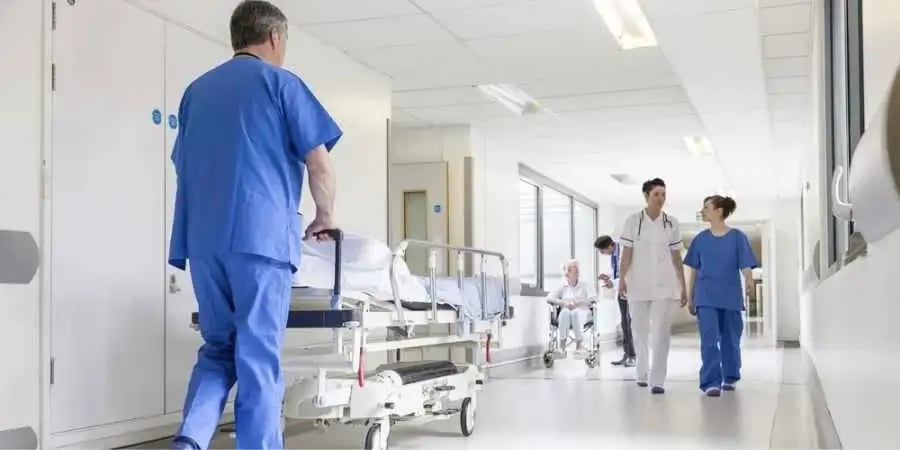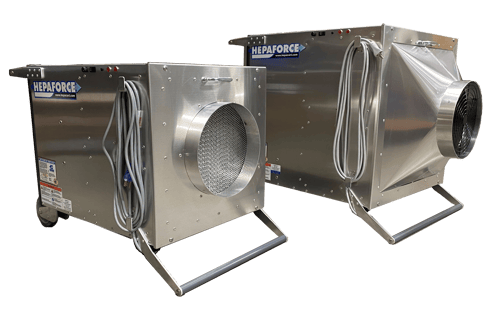Share this
Helpful Tips for Your Hospital Air Purification Systems Needs
by HEPACART on Dec 27, 2022

Hospitals are one of the most crucial areas for air filtration but can also be one of the most unique. With numerous different rooms, equipment, and needs, each will have their own set of requirements that must be met. Additionally, those who are inside the hospital likely have compromised immune systems or are around someone who does. Ensuring that there is an air purifier for dust and other particles is essential for a safe environment. Let’s look at some of the different aspects of hospital air purification systems and why they are so important.
How Filters Affect Indoor Air Quality
Indoor air quality greatly impacts an occupant’s health. That’s why hospital air purification systems should be strategically planned out and installed. Indoor air can contain pollutants like carbon monoxide, humidity, formaldehyde, and particles like dust. While these things are expected in most common places, they should be limited in healthcare facilities. With germs and bacteria, it is easy for the air in hospitals to be polluted and its occupants to pick up a healthcare-associated infection. Air filtration systems were designed to reduce airborne pollutants, including particles with viruses.
HVAC filtration systems are installed in every medical facility and will remove unwanted particles in the air such as dust, dirt, lint, and hair. When air moves across the filter, it removes these large particles from continuing to spread across the building. If the filter is in good condition, it will continue to repeat this process, leaving the air cleaner and better for breathing. The higher the quality of air filter, the more it will be able to catch. An HVAC system will not do its job if the filter is not maintained. It needs to be regularly checked to ensure that it is functioning properly and does not need to be cleaned or replaced. An old filter will allow unwanted particles to pass through freely.
Minimum Requirements
Air filtration systems in hospitals must have at least one filter that has a minimum efficiency reporting value (MERV) of 13 or higher within the system. This rating measures efficiency and the filter’s ability to trap particles between 0.3 and 10 microns. The higher the MERV ranking, the more it will be able to filter. An air purifier for dust will likely meet these criteria as household dust measures at 10 microns.
Hospice facilities where patients will be entering, nursing facilities, Class A surgery rooms and any other semi-restricted spaces should all have a MERV rating of 13 or higher. Any other spaces within a medical facility should use a filtration system with a MERV rating of 7 or higher.
Adding Additional Filtration to Your HVAC Filtration
Though HVAC systems were created to provide clean air, oftentimes additional filtrations are needed, such as air scrubbers, HEPA filters, negative air machines or UV-FORCE. These additional air filters attached to HVAC systems are designed to help trap extra particles in the air.
Air Scrubbers
An air scrubber is a device that attaches directly to your HVAC system. Adding an air scrubber not only assists with keeping the air clean, but it also prolongs the life of your HVAC system. It can serve as an air purifier for dust and dirt before it enters the HVAC filter. However, scrubbers go beyond air purification and can clean surfaces as well. Scrubbers release particles that will travel throughout the area, attract the germs off of surfaces, and pull them to the HVAC system to be filtered out.
HEPA Filters
High-Efficiency Particulate Air (HEPA) filters use a method called diffusion to trap microscopic particles. You may think that the larger the particle, the easier it is to capture. Actually, the opposite is true when it comes to diffusion. It traps 99.97% of particles that are smaller than 0.3 micrometers in diameter. If a particle is smaller than 0.1 micrometer, it is moved in a zig-zag motion at random and will likely become trapped in the HEPA filter’s maze. Interception occurs when large particles accidentally come within one diameter of the fiber and get caught. HEPA filters serve as an excellent air purifier for dust because of its ability to capture the small particles, preventing them from entering back into the air you breathe. Due to their proficiency HEPA filters have received the highest minimum efficiency reporting value (MERV) rating and are seen in most medical facility air filtration systems.
Negative Air Machines
If you have a multitude of infectious patients, using differential pressure is one of the most trusted ways to prevent the viral bacteria from spreading to other individuals. To create negative pressure in a room and keep harmful pathogens from entering, the machine would be placed inside the room with the ducting directed outside. Using negative air machines in addition to the HVAC filtration system, you can create a positive pressure isolation room that will prevent harmful pathogens from leaving the room. To create positive pressure, the setup would be opposite of negative pressure. This method is an ideal solution when it comes to keeping your other patients safe from illnesses in a medical facility.
UV-FORCE Technology
Among technology’s many advancements, a new, chemical-free sterilization method using ultraviolet light was created and has been a popular choice for air purification methods. By using far-UV light, it goes the extra mile in disinfecting the air and surfaces by completely destroying the particles and viruses. Out of all the UV technologies, UV-FORCE is by far the safest and most efficient. Its wavelength is 222 nanometers and destroys pathogens by rupturing their cell walls.
In Short
Hospital air purification systems are crucial to maintaining the health and safety of workers, patients, and visitors. While an HVAC system is mandatory, it is often not enough to meet the safety requirements. Additional purification methods are necessary. A HEPA filter is one of the most commonly used filters for medical facilities. Be sure to maintain the proper maintenance on your filtration system so it can continue to work well and provide the best air for your patients to breathe.


